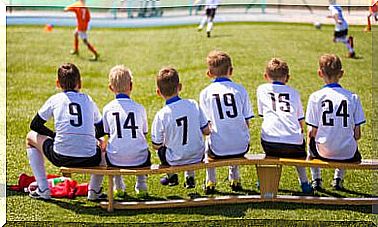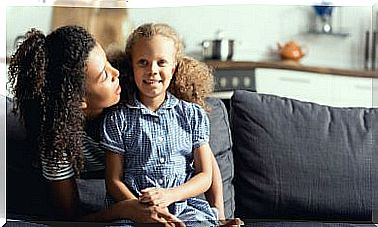You Already Know The Language Your Child Understands Best!

The language that your child understands best, you have learned from the upbringing you have received, even from generations before your parents : it does not matter if they are those things that have been transmitted to you or if they are the most difficult points that you do not want to transmit in raising your children.
The excess of information or what language do we choose to speak with them?

We have all wondered – mainly today, when we are bombarded with information on all kinds of how we should raise our children – over and over again what we must do to understand our children and how to “guess” what they are trying to communicate to us. Either when they still do not speak or when they have mastered the gift in such a way that they even tell us things through metaphors.
The answers that we usually find can vary from advice that recommends us to be affectionate with our children, or to love them unconditionally, to very specific things such as, for example, an author who advises us not to say “NO”, since, according to her, children only understand the verb (the action) in the sentence and therefore do the opposite.
Is it true that although we have read everything about how to educate our children, we always end up getting our way? And the question is : Is there another way of relating to our children other than this? Ours?
We may end up applying one or another technique or advice, which, many times, can end up complicating our lives even more. Fortunately, however, we find it very difficult to maintain certain guidelines.
A friend told me that she began to apply the Estivill method to try to make her son sleep, but could not finish it, since she could not bear to leave her son crying.
I think we have all heard what this technique consists of. You have to leave the child alone in the room, during calculated times, and between these times go in and say something that gives the child peace of mind such as: Do not worry that mother is here! But never hold her in your arms, because she has to learn to sleep alone.
It’s normal that my friend couldn’t, babies don’t have the ability to make logical assumptions like: Mom is at the door, THEN I don’t have to worry. What usually happens is that when they hear Mom’s voice they cry even more and renew the feeling that no one is coming for them.
Trying to know when and what babies or children can do, raises the infinite questions about the times in parenting: when to allow, when to prohibit, when to wean, when to remove the diaper, when to sleep alone, etc.
What to do with the information?
Of course, there are interesting information and some guidelines that can help us. In the end, we don’t want to create a prejudice against reading either. We live in the world of information and our curiosity leads us towards it almost involuntarily. The question is: What to do with it or how not to let it erase our way of relating to our children?
Once I was talking to a friend about another who had a sick child for more than a week and the first one she asked me several questions about the child: breastfeeding, vaccinations, etc. She found some contradictory explanations and said: “Surely your friend is one of those mothers who read a lot.” I found this statement very curious.
One time I was at the house of another friend who told me that she had read that at bedtime children should not be swayed in her arms, which makes them more nervous and that is why she only did it at bedtime while singing a song to her. song.
That same day at night I tried to hold my son in my arms without swinging him, but for me, who had practically slept my whole life, as a child, in seesaws and hammocks (where we were swinging), that seemed so unnatural that impossible. And also in the case of my son, the movement was exactly what helped him sleep.
This is the language to which I refer and which our children understand best. Something that comes naturally to me because it is simply that way or because it is part of my story. They are very personal things, which the authors should even refrain from giving an opinion, don’t you think?
Use self-knowledge

Regarding what can influence the health of my son, mainly his mental or mental health, the information can have an important function, as long as it touches me at an unconscious level.
I may have been brought up by slapping my parents from time to time and that comes out of inertia when my son is in the middle of a tantrum. If I don’t want to continue doing it, I have to find a new resource to help me change the way I act. It can be difficult to achieve, but if something touches me unconsciously, the change in my attitude can be more natural.
Although it may be difficult for us not to repeat certain patterns, look for ideas through reading, share with other mothers, seek therapy, etc., they are all valid and very effective ways to change those behaviors that I received in my upbringing and that I do not want to pass them on. go ahead.
So knowing how to use the information or looking for self-knowledge to help you in the upbringing of your child is precisely to give a voice to this language that you already know. Which is quite different from the rational and prominent attitude of our personal context of applying techniques to get from our children the behaviors desired by us, the parents; something increasingly common in our society, which in turn reserves a smaller and smaller space for childhood.









